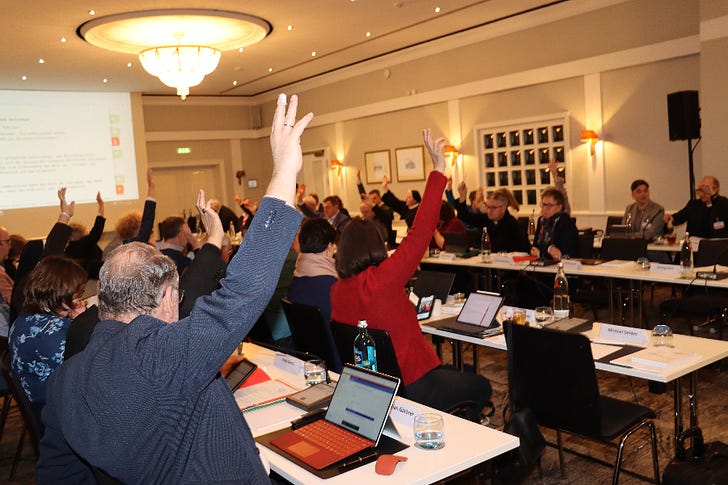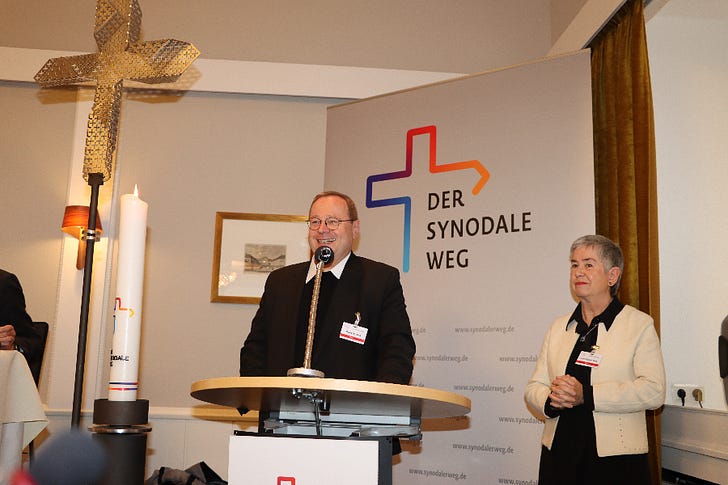
Germany’s synodal committee drops bishops’ vote rule
The synodal way’s successor body is paving the way for a permanent ‘synodal council’ in 2026.
A new body created to implement the resolutions of Germany’s “synodal way” has dropped a rule that decisions need the support of two-thirds of bishops as well as two-thirds of lay people.

Members of Germany’s “synodal committee” voted Nov. 11 in favor of statutes and rules of procedure establishing that resolutions can be passed with a simple two-thirds majority.
The committee is supposed to consist of the country’s 27 diocesan bishops, 27 delegates chosen by the lay Central Committee of German Catholics (ZdK), and 20 elected by synodal way participants. But four bishops have boycotted the body and a further four were absent from its Nov. 10-11 inaugural meeting at a four-star hotel in the Diocese of Essen, in Germany’s Ruhr valley.
The synodal way was an initiative that brought together the country’s bishops and select lay people at five “synodal assemblies” in 2020 to 2023 to discuss sweeping changes to Church teaching and practice following a devastating abuse crisis and amid a mass exodus of Catholics.
Synodal way participants endorsed texts calling for women deacons, a re-examination of priestly celibacy, lay preaching at Masses, same-sex blessings, a revision of the Catechism on homosexuality, and a greater lay role in choosing bishops.
Among the synodal way’s most controversial proposals was the creation of a synodal committee to ensure that resolutions are enacted in German dioceses and prepare the way for a permanent body called the “synodal council” in 2026.
The synodal council is described in a synodal way resolution as a national “advisory and decision-making body,” consisting of bishops and lay people, that will “take fundamental decisions of supradiocesan significance on pastoral planning, future perspectives of the Church and financial and budgetary matters of the Church that are not decided at diocesan level.”
Vatican officials said in January that the German Church had no authority to establish the body as it represented “a new governance structure” that would be “above the authority of the German bishops’ conference and would in fact appear to replace it.”
But German Church leaders remain committed to creating a synodal council, arguing that Rome’s objections are misplaced as the body will have different characteristics to those criticized by Vatican officials.
ZdK leader Irme Stetter-Karp called for a change in the voting procedure after the synodal way ended in March. She said that the “painful learning experience” of the initiative had convinced her that the rule should not apply to the synodal committee’s decisions.
All but one synodal way resolution was endorsed by the necessary two-thirds majority of bishops: A text calling for a change in the Church’s approach to sexual ethics.
Lay delegates reacted with outrage to the bishops’ vote, prompting organizers to change the rules so that the votes of each bishop would be recorded by name, which critics said led to increased pressure on bishops to vote with the majority.
After synodal committee members agreed to drop the two-thirds rule for bishops, Stetter-Karp expressed her satisfaction.
“This committee, which I would like to respectfully call a real team, will be able to achieve a great deal for the future of the Church in Germany,” commented the ZdK leader, who was not invited to the recent synod on synodality in Rome, prompting synodal way participants to express their “annoyance and disappointment” at the snub.

Not all German Catholics share Stetter-Karp’s enthusiasm for the new voting rule.
Writing for the Catholic weekly newspaper Die Tagespost, the journalist Peter Winnemöller said: “A little basic arithmetic is enough to realize that with a maximum of 20 participating bishops, they can easily be outvoted even if all bishops disagree with a decision.”
“In effect, the German episcopate is thus degraded to a synodal figurehead. It is thanks to the four non-participating bishops that this fact is now so unadorned and visible to the world. The only thing left for the Vatican to do is to make another attempt to simply prohibit every Catholic in Germany from participating in this nonsensical body.”
Synodal committee members also endorsed a proposal supported by Stetter-Karp to hold their plenary meetings in public. The ZdK head had previously described the public meetings of the synodal way — which generated widespread media coverage — as a “positive experience.”
German bishops’ conference Bishop Georg Bätzing compared the synodal committee, which he defined as a “working instrument,” to the synod on synodality, whose first session he attended at the Vatican in October.
“The synodal committee has gained momentum. I am grateful that we have now entered a new phase,” he said Nov. 11. “I am therefore happy to take up a phrase from the synod on synodality: Church on the move — we experienced this in Rome and also now in Essen.”
“The resolutions on the statutes and rules of procedure are a clear sign that we have learned and practiced synodality and its prerequisite — mutual trust in one another. The quality of the contributions and the constructive handling of amendments, the mutual approach, and the honest debate were precisely the basis for this.”
The synodal committee’s statutes and rules of procedure are expected to be published this week. They must be approved by the synodal way’s organizers, ZdK members, who will meet Nov. 24-25 in Berlin, and the German bishops, whose next plenary assembly is scheduled for Feb. 19-22 in Augsburg.
It remains unclear how the synodal committee will be funded after four diocesan bishops vetoed the use of a common fund in June. Die Tagespost has reported that four dioceses — Munich and Freising, Limburg, Münster, and Würzburg — have agreed to establish a foundation to underwrite the initiative. But there was no announcement on funding at the end of the inaugural meeting.





You mean the Parliament/Assembly/Congress/Senate/Committee/Tribunal/Party/Synod has granted itself absolute governing power? Wow, who saw that coming? That definitely has no precendent whatsoever in all of history....
At this point I'm just wondering when this is going to treat the abuse crisis in Germany, which was the intended aim of this whole enterprise.
Whenever a news story comes out about the Pope paving the way for gay marriage or female priests, it's interesting to see the comments on left- and far-left leaning sites like Reddit and Imgur. Overwhelmingly, there is no applause. No joy. They sneer, because they see it as just another publicity stunt to distract from the child sex abuse crisis. They cite it as proof that all the rules are made up, that the Church is just another human organization that doesn't believe in it's own teachings but changes them to support its greed, that all this "change" is just desperate grasping at straws in reaction to loosing money as people leave the church.
They're leaving the sheepfold and the 99 in search of the one lost sheep, but only because there are wolves preying on the 99 and they simply don't want to deal with it.